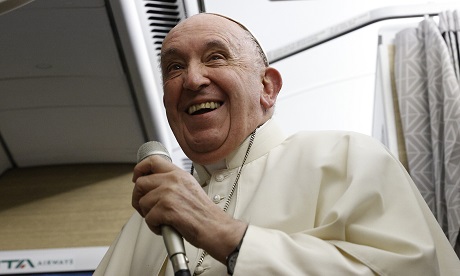“Could the Church teaching on contraception change?” a journalist asked Pope Francis on Saturday during his return flight to Rome from Canada.
“This is very timely,” Francis replied.
“But know that dogma, morality, is always in a path of development, but development in the same direction.”
Tradition can really be preserved and handed down only by allowing it to develop, he explained.
He then brought up a controversial 528-page book Theological Ethics of Life: Scripture, Tradition, and Practical Challenges.
One topic the Vatican-published book discusses is the possible legitimacy of contraception in certain cases.
Catholic Church teaching says “legitimate intentions on the part of the spouses do not justify recourse to morally unacceptable means (for example, direct sterilisation or contraception)”.
The book is a record of the proceedings of a congress, Francis explained. “In a congress there are hypotheses, then they discuss among themselves and make proposals.
“We have to be clear: those who made this congress did their duty because they tried to move forward in doctrine, but in an ecclesial sense as I said with that rule of St Vincent of Lerins.
St Vincent taught “that true doctrine in order to go forward, to develop, must not be quiet … it consolidates with time, it expands and consolidates, and becomes more steady, but is always ‘progressing”.
“That is why the duty of theologians is research, theological reflection. You cannot do theology with a ‘no’ in front of it … the magisterium will be the one to say no,” Francis explained.
“To guard and to pursue are in the very nature of the Church, so that the truth present in Jesus’ preaching of the Gospel may grow in fullness until the end of time,” he said.
“Saint John Paul II himself, in presenting the new Catechism of the Catholic Church, said ‘it must take into account the doctrinal statements which down the centuries the Holy Spirit has made known to his Church. It should also help illumine with the light of faith the new situations and problems which had not yet emerged in the past’.”
The challenges we have today are different from the old ones, he added.
“They’re even different from the ones we faced 30 years ago. That’s why we have Councils and Synods and there have been two assemblies of bishops to discuss marriage and family, in social contexts that change at a very fast pace.”
We need to do more than find a new language in which to articulate our perennial faith, Francis says.
It’s urgent, given humanity’s new challenges and prospects, that the Church be able to express the “new things” of Christ’s Gospel.
Although present in the word of God, they have not yet come to light.
This is the treasury of “things old and new” of which Jesus spoke when he invited his disciples to teach the newness that he had brought, without forsaking the old,” Francis clarified.
Source
